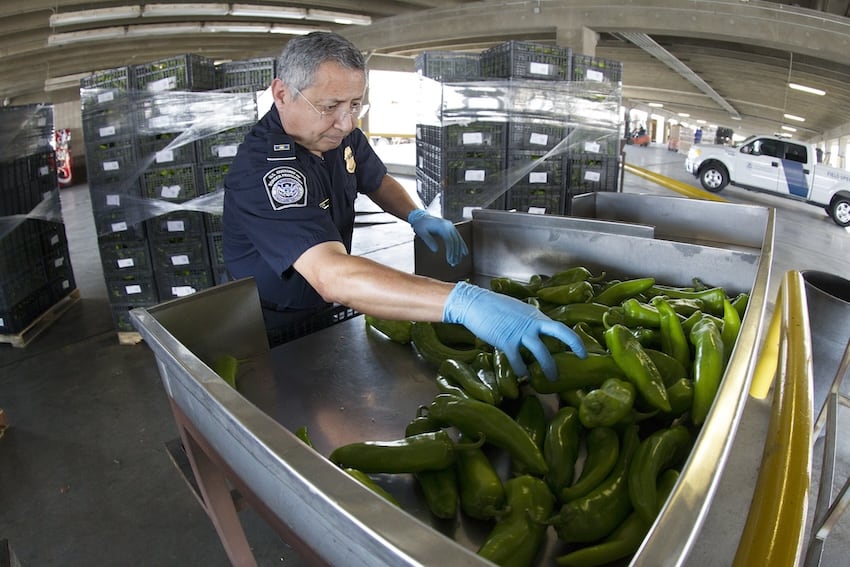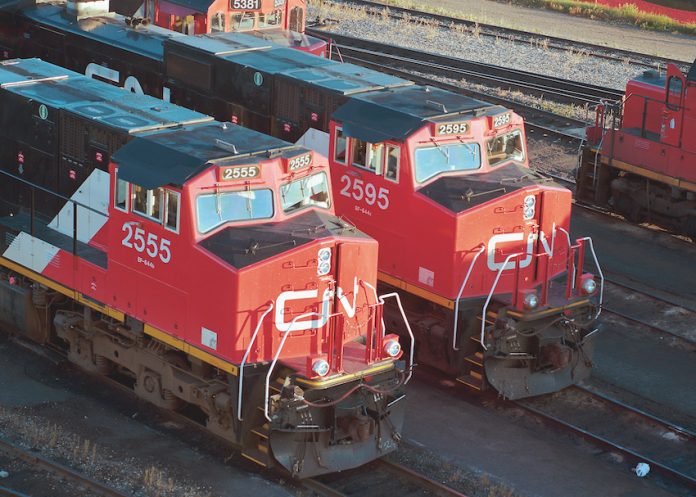Top Mexican farm lobby CNA has warned that the closure of two rail bridges between Mexico and the United States could cause “large losses” and threaten food security, while the Mexican Employers Federation (Coparmex) has called on authorities on both sides of the border to “deal with the migration crisis without affecting the flow of goods.”
U.S. Customs and Border Protection (CBP) announced Sunday that its Office of Field Operations would “temporarily suspend operations at the international railway crossing bridges in Eagle Pass and El Paso, Texas,” at 8 a.m. Monday “in order to redirect personnel to assist the U.S. Border Patrol with taking migrants into custody.”

Reuters described the two bridges as “vital to cross-border trade worth billions of dollars.”
In a statement on Wednesday, the National Agricultural Council, or CNA, said that the decision to close the two rail bridges on the Mexico-U.S. border is affecting international trade between the two countries, including the southward flow of yellow corn and soymeal used as livestock fodder as well as products for “industrial use.”
Around 25% of Mexico’s yellow corn imports and almost 63% of soymeal imports enter the country via those two crossings, the CNA said.
“It’s important that the trade flow from … [the United States] is not interrupted considering the negative impact this could set off in supply chains of various products,” the farm lobby said, adding that national food security could be “significantly” compromised.

The CNA said that Mexico is currently estimated to have soymeal supplies for 3-8 days and corn supplies for 8-20 days and thus the rail bridge closure “problem” should be attended to as a matter of priority.
A lack of fodder for animals such as cattle and pigs could eventually have an impact on the supply of meat on both sides of the border.
The CNA said that “large [economic] losses are expected due to a problem of a migratory origin that is having repercussions in the commercial sector of both countries,” and called on Mexican and United States authorities to “promptly intervene to reach a solution and agreement that allows the reopening of these rail crossings.”
Similarly, Coparmex urged Mexican authorities, “specifically the Ministry of Foreign Affairs and the Ministry of the Economy,” and their U.S. counterparts “particularly the federal government and the government of Texas,” to “deal with the migration crisis without affecting the flow of goods given that this measure only causes harm for the economies of both nations.”
It noted that the suspension of operations at the two rail bridges came after other border crossings, including the Lukeville Port of Entry in Arizona, were closed, and asserted that the closures as well as “excessive” truck inspections that have been carried out by the Texas government have left goods worth more than US $2 billion “stranded.”
“Discretionary measures” implemented by U.S. authorities deal a “heavy economic blow” to Mexico and “undermine trust between both countries,” Coparmex said in a statement.
“… At Coparmex we believe that these measures … represent a failure in migration policy, which should focus on preventing people being forced to abandon their places of origin, instead of simply stopping their movement.”
On the X social media platform on Wednesday, rail freight operator Union Pacific called for the Eagle Pass and El Paso rail crossings to be “reopened immediately.”

“This closure impacts Union Pacific train crews, who are not working right now,” the company said.
CBP cited “a recent resurgence of smuggling organizations moving migrants through Mexico via freight trains” as a reason for closing the two rail bridges, but Union Pacific said in another post on X that “during this massive [migration] surge only 5 people have attempted to come into the U.S. on Union Pacific trains in the last 5 weeks.”
It also said it “invests billions annually to protect our rail network, including technology and resources to secure U.S. border crossings” and that “UP Police and our employees work in partnership with U.S. Customs and Border Protection to ensure all trains are screened, using X-ray technology and visual inspections, and unauthorized people or contraband are apprehended.”
Union Pacific said Tuesday that “roughly 450,000 rail shipments” move across the Eagle Pass and El Paso rail bridges annually.

“It would take over one million trucks to move the same amount of goods. These locations represent 45% of cross-border Union Pacific business and include goods critical to the U.S. economy,” it added.
The company estimates that US $200 million worth of goods usually passes over the Eagle Pass and El Paso rail bridges on a daily basis, and has said that it has insufficient capacity at other gateways to reroute trains. Among the goods currently halted are grain, beer, dry food products, finished vehicles and parts, consumer goods and industrial commodities, according to Union Pacific.
“The longer this closure is in effect, the more difficult it will be for cross-border trade to resume,” the company said.
Mexico’s main poultry producers association, and the National Grain and Feed Association (NGFA) and the North America Export Grain Association (NAEGA) in the United States are among other organizations that have voiced concerns about the rail bridge closures.
“The North American market and grain trade supply chain are deeply intertwined. The closure of these two crossings is impacting the flow of grain and oilseeds for both human and livestock feed to one of the United States most important export markets and trading partners,” the NGFA and NAEGA said in a statement on Monday.
“… NGFA and NAEGA have become aware this afternoon of critical tightness in feeding supplies for several livestock feeders in Mexico. We have also learned of grain trains in multiple states being held for shipment due to CBP’s embargo. The critical nature of this issue is growing by the hour, particularly for those livestock feeders that may run short of feed,” the associations said.
“We are deeply concerned by the developing situation and request that CBP work with us, the railroads and other federal partners to develop a common sense and expedient solution that reopens this critical mode of agricultural transportation for the U.S. and North American markets.”
With reports from Reuters
